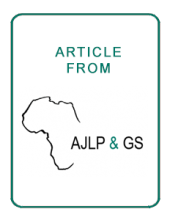/ library resources
Showing items 28 through 36 of 73379.This article discusses different issues pertaining gender and land governance with focus to access and control of land by rural women and how this affects their resilience in G5-Sahel region- Chad, Niger, Burkina Faso, Mali, and Mauritania.
Both land expropriation and eviction constitute a threat to the properties and life of local communities.
Rwanda has implemented a land tenure regularization program since 2008 that enabled the adjudication and registration of land rights for both men and women. However, Rwandan women are vulnerable to land conflicts because some men do not recognize or respect women’s rights in land.
The adoption of modern Land Administration Systems (LAS) in Sub Saharan Africa is done with the expectation that principles of equity, non-discrimination, efficiency, transparency, productivity and sustainability among others may be achieved to meet societal needs in those countries.
ABSTRACT Urban land in Zimbabwe is a lucrative economic and thus political asset.
This paper analysed land governance and crop commercialization in Nigeria. General Household Survey (Living Standard Measurement Survey) panel data for the post-planting and post-harvest periods of 2015 and 2016 cropping seasons were used.
Global concerns about fossil fuel prices and climate change have directed focus on prospects of biofuels.
The Absorption of rural Landscape by the process of urbanization is a critical issue leading to several, economic and environmental complications.
L’accès des femmes au foncier est au cœur de l’actualité depuis trois décennies. Dans le Sud de la Mauritanie, la mainmise des hommes sur les terres est une réalité. Les femmes ne représentent que 4.2% des détenteurs des Titres fonciers.
Paginación
Land Library Search
Through our robust search engine, you can search for any item of the over 64,800 highly curated resources in the Land Library.
If you would like to find an overview of what is possible, feel free to peruse the Search Guide.

